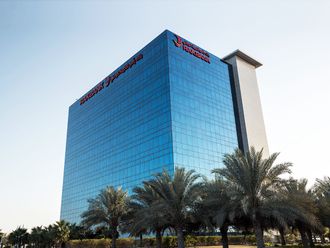In many emerging Muslim-majority countries the growth of Islamic Finance has become a matter of public policy and they often look to countries like the prosperous USA as an economic and social role model. Following recent events, I have concluded that the core principles underpinning Islamic Finance, or to use my preferred and more literal and inclusive term “Participation” Finance, are more relevant now than ever.
It is the dramatic political upsets of 2016 — Britain’s decision to exit the European Union on June 23rd and the election of Donald Trump on November 8, that signal the ongoing wealth “exclusion” is going too far. It is difficult for those already economically pressured to show compassion for “foreigners”. Instead, increasing feelings of intolerance and isolationism are more likely. The USA displays incredible dynamism but highly concentrated, wealth creation. This has encouraged me to write on the topic with the hope of provoking further debate and promoting what I feel is actually an “old” form of inclusive capitalism.
Financial inequality
In my opinion, one of the main drivers of these upsets was, and (more importantly for the future) remain, the exclusion or lack of ‘participation’ of the middle and lower income segments of the population in the extensive wealth creation of recent decades, often driven by globalisation and technology. The Organisation for Economic Co-operation and Development (OECD) report — The Gap between Rich and Poor — published in 2015 highlights that the richest 10 per cent controlled 50 per cent of all household wealth in OECD countries, the top 1 per cent held 18 per cent and the poorest 40 per cent controlled only 3 per cent of wealth. The report highlights that when looking at “Gini points” (a measure for income inequality, with zero being everyone equal and 100 being the worst, unequal score) the USA ranked second for inequality at almost 40 points (close to Turkey but behind Mexico at around 47), whereas the OECD average was around 31. The report also revealed that in America, one of world’s most prosperous countries, over 17 per cent of people lived below the poverty line, a level exceeded only by Chile, Turkey, Mexico and Israel.
Consumption driven leverage
A McKinsey Global Institute study published in July 2016 — Poorer than their Parents — showed that over 65 per cent of people in advanced economies (around 550 million people) saw stagnant or declining income from 2005 — 2014 compared to less than 2 per cent (<10 million) from 1993 — 2005. More specifically the UK stood at 70 per cent and the USA at 81 per cent, among the highest of the countries surveyed. In both countries, the post GFC economic growth strategy has been to restart the supposed perpetual and debt-based consumption models that — coupled with the excessive financialisaton of the economy (such as the securitisation and then re-securitisation of consumer loans) have contributed strongly to such inequality over the last few decades. Excessive borrowing gave the short-term illusion of an improved standard of living but the fiction was exposed once credit-driven growth evaporated — despite the almost free money provided by QE and households sought to sensibly reduce their debts.
Luckily, there is now increasing awareness and appetite for more equitable and inclusive forms of capitalism. The dominant economic Neoliberal ideals (notably promoted by economists Friedrich Hayek and Milton Friedman) of recent decades promote competition over community and deliberately creates a society with “winners” and “losers”. Clearly such policies have negative impact on equality and are contrary to the social and ethical principles inherent in Participation Finance.
Equitable distribution
“When you combine ignorance and leverage, you get some pretty interesting results” — Warren Buffett
Participation Finance promotes tangible asset-backed versus unsecured finance. Thus, it becomes more difficult for citizens to leverage heavily for consumption when unsecured debt is discouraged — it simplistically becomes difficult for consumers to buy-things-they-don’t-need-with-money-they-don’t-have. It should be highlighted that equity investment is a form of asset-backed financing, with the asset being a share in a tangible and productive business.
It is the “1 per cent” (or 10 per cent) wealthy described above who as business (equity) owners or investors (in equity and property) use debt/leverage to multiply their gains further. Now it is a reasonable assumption that the 99 per cent have likely have a much higher proportion of wealth in low/zero-interest cash, with the poorest more likely to have highest proportion of cash as a share of their net worth.
This cash-bias, when combined with the higher (risk-adjusted) gains attributable to equity holders is helping to inadvertently drive more financial inequality. If, in keeping with Participation Finance principles, more of the population were to collectively have more of their cash invested in income-generating assets — such as equities — perhaps as part of their compensation or mandatory long-term savings plans, this would help share some of the global wealth creation with the other 99 per cent.
Here are some ideas for stakeholders to consider
1. Islamic Finance 2.0. Application of new technologies and regulation to facilitate increased awareness around the core principles of Participation Finance and hence encourage long-term asset/equity investment at the bank retail level, with more product differentiation.
2. The creation of “Social Wealth Funds” with mandatory contributions from citizens and/or resident expatriates where they do not already exist.
3. Creation of more retail-oriented, low-cost funds within banks, existing pension or sovereign wealth funds.
4. Formalisation of funding for statutory corporate liabilities and employee benefits into a fund structures.
Most critically, the corporate governance, fee and incentive structures around these ideas would be critical to their success. I hope that 2017 will see further developments in inclusive capitalism using Participation Finance principles and hence moderate the inequality driving the discontent highlighted by Trump and Brexit.
Khalid Ferdous Howladar is the Managing Director & Founder of Acreditus, a new strategic consultancy












